7+ Sample Non-Solicitation Agreement
-
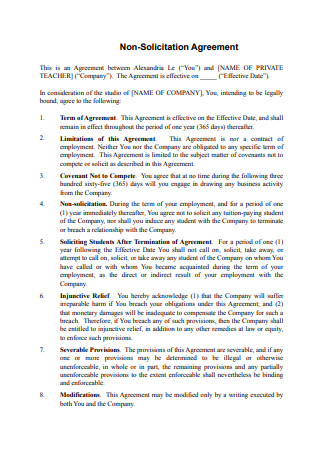
Non-Solicitation Agreement Template
download now -
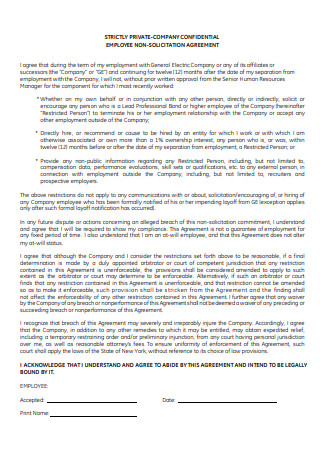
Employee Non-Solicitation Agreement
download now -
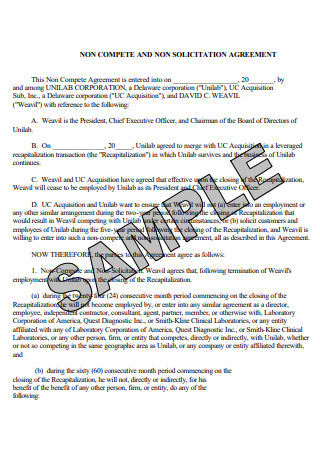
Sample Non-Solicitation Agreement
download now -
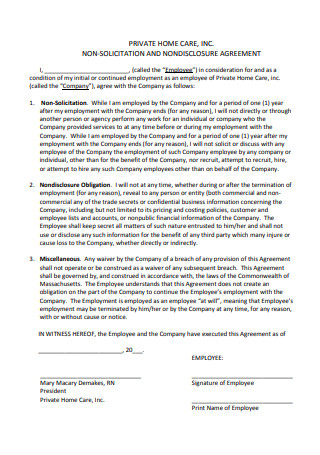
Non-Solicitation and Non-Disclosure Agreement
download now -
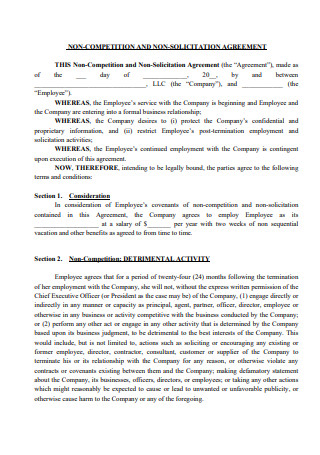
Non-Competition and Non-Solicitation Agreement
download now -
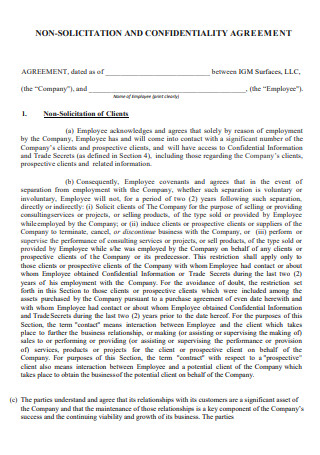
Non-Solicitation and Confidentiality Agreement
download now -
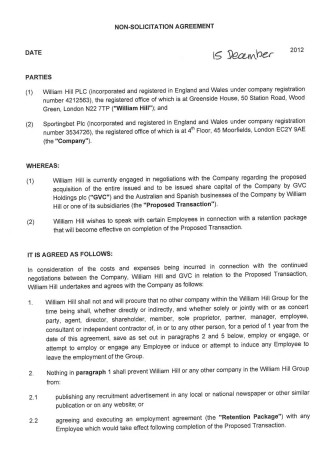
Non-Solicitation Agreement in PDF
download now -
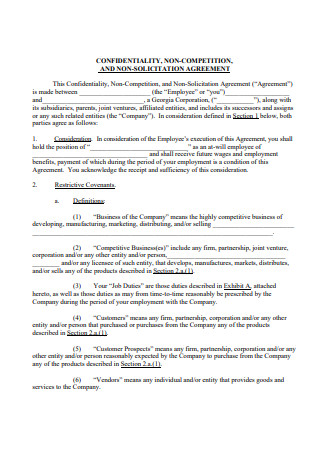
Non-Solicitation Agreement Example
download now
FREE Non-Solicitation Agreement s to Download
7+ Sample Non-Solicitation Agreement
What Is a Non-Solicitation Agreement?
When Is a Non-Solicitation Used?
Why Is There a Need to Use a Non-Solicitation Agreement?
What Is the Difference between a Non-Solicitation Agreement and Non-Compete Agreement?
Elements of an Enforceable Non-Solicitation Agreement
How to Write a Non-Solicitation Agreement
FAQs
Can a Non-Solicitation Email be Sent on Social Media?
Can a Company be Liable for Overt Solicitation?
What Does it Mean to Use the Word Solicitation?
Non-solicitation clauses, on the other hand, make it impossible to make a living. It is possible that non-solicitation agreements will be applicable in specific circumstances. In this section, we will discuss the reasons why businesses employ this agreement, the language used in the contracts, and the circumstances under which it is enforceable. This is the appropriate area to continue your search for more detailed information regarding non-solicitation agreements.
What Is a Non-Solicitation Agreement?
It is the responsibility of the employer to implement a non-solicitation agreement in order to protect their company’s brand identification, goodwill, and intellectual capital, and to ensure that employees do not degrade any of these assets once their employment has ended. After leaving the company, the employee learns that the information they have gathered during their time at the employer’s office is critical to the organization’s ability to function properly in the future. As a result, the employees are required to retain and preserve the information for a specified period of time, as specified in the agreement, in order to prevent the employer from experiencing any difficulties while dealing with their classified material.
In the event that an employee decides to use the information against the employer’s company, the employer may be able to hold the employee legally responsible. Using this agreement, you may ensure that your firm’s future interests are safeguarded against claims made by former workers, contractors, and agents of the company. Other templates are available on our website, and you can use them whenever you need them. They are as follows: business proposal, employment contract, non-compete agreement, labor contract, subcontractor agreement, non-solicitation letter, waiver of the non-compete letter, termination agreement, non-poaching agreement, employment write-up form, and other similar templates are available. This post will not only provide you with templates but will also provide you with important information that you need to know in order to complete your template.
When Is a Non-Solicitation Used?
A non-solicitation agreement is used anytime a company wishes to retire an employee of a particular rank or designation who has extensive knowledge of the organization’s operations and who is not permitted to solicit other employees. According to the terms of a non-solicitation agreement, an employee is not permitted to seek employment with any of the employer’s competitors once their employment with the company has come to an end. When large firms retire their CEOs and CFOs, they may opt to use this arrangement to protect their interests. When dealing with non-contract workers and agents, small enterprises and organizations can benefit from the adoption of non-solicitation agreements.
Some employees have access to such classified material and have gained intellectual knowledge from their employer during the course of their employment, which will be detrimental to the employer and its business if the information is exploited by competitors against them. As a result, these employees are instructed to refrain from engaging in any formal or informal business contacts with competitors that may provide them with access to proprietary information that could offer the competitors an unfair competitive advantage over the employer. It is also employed by employers in the case of employees who have been provided with the critical intellectual property during the course of their employment in order to make their jobs easier. Within a reasonable time frame, it requests that they secure and protect this information.
Why Is There a Need to Use a Non-Solicitation Agreement?
Contractual non-solicitation agreements can be entered into at the start of a contract or throughout the course of a job. They can also be entered into during the course of a job. These agreements are particularly popular in service or sales organizations where there is a restricted number of customers to service. Non-solicitation agreements are intended to prevent employees from recruiting both other employees and customers after they have left their jobs, according to the American Bar Association. The assumption is made that an individual working for a company that sells copper wires has communicated with the sellers of that exact product all over the world, as is common in the industry. The person will be subject to restrictions if he or she is offered a better opportunity and chooses to accept it. This is especially true if the person or firm has signed a non-solicitation agreement with the former employer.
Because the individual is no longer associated with the company, the agreement prohibits the individual from requesting that the new company alter its dealers. Similarly, companies may prohibit passive or indirect solicitation, which means that if an employee establishes his or her own business, he or she will not be able to publicize it while leaving the workplace. These limits are in place to keep employees from leaving the company. Another situation in which a non-solicitation agreement might be employed is when it is necessary to determine who owns the intellectual property. It is preferable to state unequivocally that the corporation owns all intellectual property rights, trademarks, patents, and trade secrets.
What Is the Difference between a Non-Solicitation Agreement and Non-Compete Agreement?
There are two main types of contracts that can be made inside a corporate organization: non-solicitation agreements and non-compete agreements. Non-solicitation agreements and non-compete agreements are both types of contracts that can be made. Some organizations ask their new workers to sign both agreements before they are allowed to work for them. Both of them are believed to be similar, but they differ in several ways. We shall recognize the contrasts between them in this section.
1. Non-Solicitation Agreement
These agreements are specific in that they prohibit the departing employee from hiring any of the company’s employees in his or her own business after leaving the organization. Each of these agreements has a specific period and geographic radius associated with it. Furthermore, the employee is not permitted to apply any of the instructions or tactics that his former employer has been employing in the past. Given that he has put the company’s trade secret at risk, he may suffer severe repercussions in this situation.
2. Non-Compete Agreement
This is a general type of agreement in which the employee agrees not to start a business that competes with his or her employer’s products or services. This agreement is signed due to the uncertainty of the company, which is concerned that its staff may compromise their procedures and trade secrets in order to start their own business. The contract specifies the length of time and the geographic area where the limits apply. This means that an employee of a specific firm is ineligible to open any other companies within a specific geographic area for a specified period of time.
Elements of an Enforceable Non-Solicitation Agreement
Firms that have rigorous non-solicitation agreements find it difficult to enforce them within their own organizations, just like any other restricted clause. However, in order to be enforced, it is necessary to define the scope of non-solicitation agreements. In this section, we will discuss the factors that contribute to the enforceability of a non-solicitation agreement sample.
How to Write a Non-Solicitation Agreement
Non-solicitation agreements are becoming increasingly prevalent as the tendency of individuals quitting their current employers to start their own businesses continues to expand. After all, businesses have a genuine reason to defend their interests and prevent former employees from snatching their top-talent or high-profile customers. While these agreements will always be written in difficult-to-understand legalese, we hope that this article has provided you with a better understanding of the spirit of non-compete and non-solicitation agreements. As always, if you have any specific queries about non-solicitation agreements, you should consult with an employment attorney in your area. This material is not intended to be a substitute for legal advice, and it is only provided for general informational purposes.
Step 1: Write the Term
The word refers to the period of time that the non-solicitation agreement is in effect. The period could last several months or perhaps several years, but it must come to an end. Longer durations are typically viewed as suspect by the courts, but it also relies on how valuable the former employee is to the organization.
Step 2: Cover the Solicitation and No Hire
These agreements can address either one or both of the following issues: bringing in clients from the previous company or hiring former co-workers who have left the company.
Step 3: Indicate the Covered Employees
Including a no-hire provision that includes a broad prohibition on poaching, the staff is a bad idea. It’s not popular with the courts, and you don’t require that much protection anyhow. There are numerous businesses that provide low-skill occupations that may be learned in a few months. The use of non-solicitation agreements to shield this personnel is unnecessary and shouldn’t be implemented. Instead, you should only protect the individuals who are critical to your business and who cannot be readily replaced. In order to be successful, you must be able to demonstrate that losing these individuals will make it more difficult or impossible to manage your organization.
Step 4: Agreement Exceptions
Exceptions to non-solicitation agreements help employees and judges accept them. They also assist clarify your expectations. A non-solicitation agreement shouldn’t prohibit a wide public advertisement because your employees might view a “now hiring” announcement. Regular non-solicitation agreements also allow you to hire former employees for unrelated reasons. As a result, firms won’t use this as a loophole.
Step 5: Transition Provisions
Contractors under a service agreement can also sign non-solicitation agreements. Some services may require employees from the first organization to work full time for the second, such as a temp agency that places people in local jobs. But sometimes the second company needs someone to fill in. The transition phase occurs between the decision to terminate the contract and the company’s ability to hire a replacement. Because of this, non-solicitation agreements frequently include special transition terms. For example, the second employer can pay the employee’s salaries until a successor is trained.
The post has come to a close after providing a thorough introduction to the non-solicitation agreement. This agreement is provided to the company’s employee at any moment over the course of his or her duties. He is required to follow all corporate policies and procedures, as well as to address the problems of the company. These laws include a prohibition on soliciting the employees of any company, among other things.
FAQs
Can a Non-Solicitation Email be Sent on Social Media?
An exception to this is when a generic message or connection request is sent on social media and does not breach the terms of a non-solicitation agreement. However, because it is so easy for solicitation to occur, even accidentally, on social media, employees who are subject to non-solicitation agreements must exercise extreme caution while communicating with coworkers.
Can a Company be Liable for Overt Solicitation?
No, and employers are well aware of this. This is why they will frequently need an employee to sign both a non-compete agreement and a non-solicitation agreement when they hire them. This means that workers who engage in overt and explicit solicitation are likely to be found in violation of their non-solicitation agreements and will face serious legal consequences if they are prosecuted.
What Does it Mean to Use the Word Solicitation?
Inappropriate wording: The term “solicitation” can refer to a variety of distinct things. For example, stealing clients, poaching workers, and generally leveraging inside information for the benefit of another organization are all possibilities. It is critical that you describe solicitation in your agreement in terms of what you do not want the employee to do if you want your agreement to have any meaning.
The post has come to a close after providing a thorough introduction to the non-solicitation agreement. This agreement is provided to the company’s employee at any moment over the course of his or her duties. He is required to follow all corporate policies and procedures, as well as to address the problems of the company. These laws include a prohibition on soliciting the employees of any company, among other things. A company employee is not permitted to promote his or her own business while working in the company’s environment. There is a distinction made in the article between the context of non-solicitation agreements and the context of non-compete agreements. The agreement’s text is also detailed in-depth, including the terms and conditions. The article goes into great detail on each of the topics.
